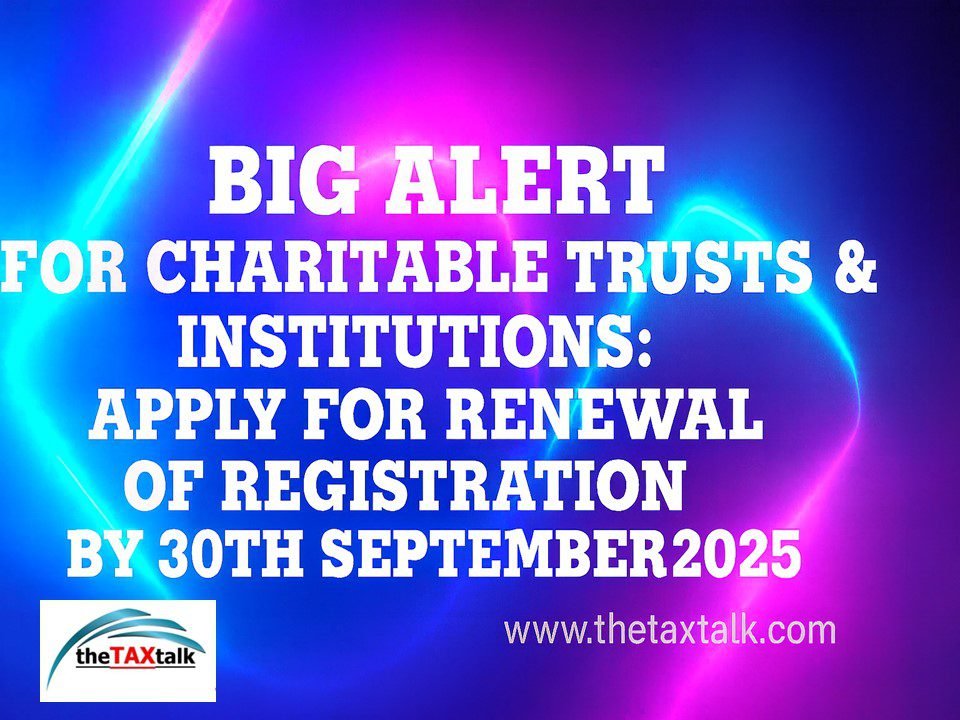![]()
Big Alert for Charitable Trusts & Institutions: Apply for Renewal of Registration by 30th September 2025
Charitable and religious trusts, NGOs, and other institutions registered under the Income-tax Act enjoy exemption of their income, provided they hold a valid registration under section 12AB or approval under section 10(23C). However, what many trustees and office bearers may not have noticed is that the present registrations are not permanent. They come with a limited validity period, after which renewal is mandatory.
The clock is ticking fast. For trusts and institutions whose existing registration is due to expire on 31st March 2026, the law mandates that they must apply for renewal at least 6 months before expiry, i.e., on or before 30th September 2025.
Why is Renewal Mandatory?
When the Income-tax Act was amended in 2020, a new regime of registration for charitable and religious trusts was introduced. All existing registrations under 12A/12AA or 10(23C) had to be migrated to 12AB or fresh approval under 10(23C). Initially, these were given only for a period of 5 years.
That 5-year block is now coming to an end for the first batch of trusts, and hence renewal before expiry is compulsory.
Consequences of Not Renewing in Time
This is where the law has its sharpest sting. If a trust fails to renew:
1. Exemption ends automatically – The trust will lose its tax-exempt status.
2. Section 115TD applies – Famously called the exit tax provision, this section treats the trust as if it has ceased to exist for charitable purposes. In such a case:
• The fair market value of the net assets of the trust (land, building, investments, corpus funds, etc.) will be deemed as income.
• Tax will be levied at the maximum marginal rate (MMR), currently around 42.744% in many cases.
To put it simply: failure to renew could mean that the trust ends up paying nearly 40% of its entire net worth as tax – a death blow for any charitable organisation.
Illustration
Suppose a charitable trust holds assets worth ₹10 crore (land, building, deposits, and investments), and it forgets to renew registration by the deadline. The exemption will lapse, and under section 115TD, it will be liable to pay:
• Deemed income = ₹10 crore (FMV of net worth)
• Tax @ 42.744% ≈ ₹4.27 crore!
This is not just a penalty – it is virtually a confiscation of charitable assets.
Common Mistakes Trustees May Make
1. Assuming old registration is permanent – Many trusts registered decades ago still think their old 12A/12AA registration continues for life. That is no longer true.
2. Waiting till March 2026 – The law clearly says “apply at least 6 months before expiry.” Waiting till the last minute will be too late.
3. Confusing renewal with re-approval under other sections – For example, trusts having both 12AB and 80G approval must separately track both validity periods.
What Trustees Should Do Immediately
1. Check the validity of your registration/approval under section 12AB or 10(23C).
2. Mark the deadline – For those expiring on 31st March 2026, the cut-off is 30th September 2025.
3. Prepare documents – Updated trust deed, PAN, activity details, financials, etc., will be required.
4. File Form 10AB electronically on the income tax portal well in advance.
5. Get professional guidance – Since mistakes in filing may lead to rejection, do not take chances.
A Word of Caution
The income tax department is closely monitoring compliance by charitable and religious institutions. With increasing use of technology and data analytics, it is almost impossible for a trust to “slip under the radar.” Non-compliance not only results in financial disaster but also tarnishes the reputation of the organisation and its trustees.
Conclusion
Charitable trusts and institutions were created to serve society, but they cannot do so effectively if their very existence is threatened by non-compliance. Renewal of registration under the Income-tax Act is not a mere formality – it is the lifeline that keeps their tax exemption alive.
Trustees, managers, and office bearers must act now.
– Deadline: 30th September 2025
– Risk of delay: Exit tax under Section 115TD at maximum marginal rate
In the world of tax law, deadlines are unforgiving. Missing this one could cost your trust its very foundation.p


